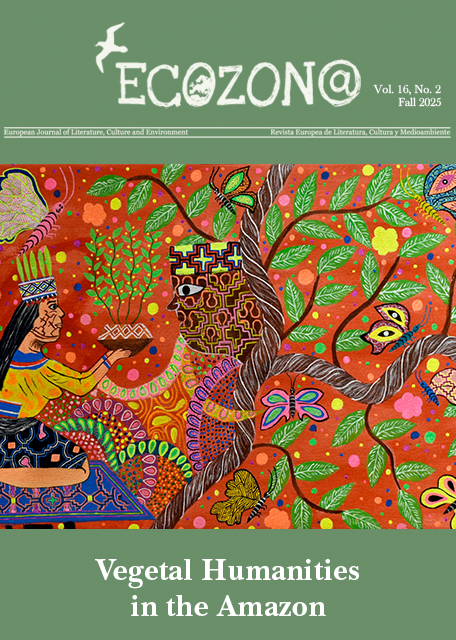<b>Ecocritical Engagement in a Pixelated World</b> // El compromiso ecocrítico en un mundo pixelado
DOI:
https://doi.org/10.37536/ECOZONA.2017.8.2.1351Schlagworte:
Video games, ecocriticism, new materialism, interactivity, attention // Videojuegos, ecocrítica material, interactividad, atenciónAbstract
How does one talk about materiality or embodiment when the “body” and the “environment” in question are forever separated by a screen? Through close readings of Proteus (Twisted Tree, 2013) and Islands: Non-Places (Ice Water Games, 2016), this essay argues that certain video games articulate empathetic relationships between player and world, because of—rather than despite—the video game’s position as a virtual realm. Because these two games limit player interaction and manipulate experiences of time, Proteus and Islands: Non-Places force the player to critically inhabit her position in the world and to question her expectations of dominance and control typically experienced in video games. Applications of material ecocriticism drive the readings of these video games. Specifically, by considering theories of time—both Anna Tsing’s pace of walking and Rob Nixon’s slow time of environmental disaster—together with Jane Bennett’s concept of vibrant matter and Serenella Iovino and Serpil Oppermann’s definition of material ecocriticism, this essay argues that the worlds of Proteus and Islands: Non-Places demand an environmental attention from the player. These two games reject the human desire to touch, cultivate, and master the environment, offering, instead, a digital assemblage that includes the corporeal player and the virtual world. Proteus and Islands: Non-Places, human-made constructions designed for human consumption, drive an investment in the vibrancy of the world—both within the game and without.
Resumen
¿Cómo se puede hablar de la materialidad o la personificación cuando el “cuerpo” y el “ambiente” de los cuales hablamos están siempre separados por una pantalla? Mediante un análisis cuidadoso de Proteus (Twisted Tree, 2013) y Islands: Non-Places (Ice Water Games, 2016), este trabajo argumenta que algunos videojuegos fomentan la relación empática entre el jugador y el mundo a causa de—y no a pesar de—la existencia del videojuego como un mundo virtual. Como estos dos juegos limitan la interacción del jugador y manipulan la experiencia del tiempo, Proteus y Islands: Non-Places obligan al jugador a reflexionar sobre la posición que ocupa en el mundo y a cuestionar las expectativas de dominio y control que típicamente se hacen realidad en los videojuegos. El uso de la ecocrítica material impulsa el análisis de estos videojuegos. Concretamente, al considerar algunas teorías del tiempo—como la idea del “paso de la caminata” de Anna Tsing y la noción de la “violencia lenta” de Rob Nixon—junto al concepto de la materia vibrante de Jane Bennett y la definición de la ecocrítica material propuesta por Serenella Iovino y Serpil Oppermann, este trabajo sostiene que los mundos de Proteus y Islands: Non-Places exigen que el jugador considere el medio ambiente. Estos dos juegos rechazan el deseo humano de tocar, cultivar y dominar el ambiente; más bien ofrecen un montaje que incluye al jugador físico y el mundo virtual. Proteus y Islands: Non-Places, que son construcciones hechas por el ser humano para ser vividas por el ser humano, impulsan una apuesta por la vitalidad del mundo—tanto dentro como fuera del juego.
Downloads
Downloads
Veröffentlicht
Ausgabe
Rubrik
Lizenz
Authors who publish with this journal agree to the following terms:
a) Authors retain copyright and grant the journal right of first publication with the work simultaneously licensed under a Creative Commons Attribution License that allows others to share the work with an acknowledgement of the work's authorship and initial publication in this journal (CC BY-NC for articles and CC BY-NC-ND for creative work, unless author requests otherwise.
b) Authors are able to enter into separate, additional contractual arrangements for the non-exclusive distribution of the journal's published version of the work (e.g., post it to an institutional repository or publish it in a book), with an acknowledgement of its initial publication in this journal.
c) Authors are permitted and encouraged to post their work online (e.g., in institutional repositories or on their website) prior to and during the submission process, as it can lead to productive exchanges, as well as earlier and greater citation of published work (See The Effect of Open Access).










